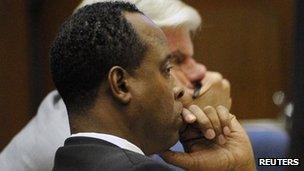Murray 'deviated' from norms in medical care of Jackson
- Published
Dr Paul White said during cross-examination that he had never heard of propofol being used in a bedroom
Dr Conrad Murray deviated from accepted medical standards in his care for Michael Jackson, a medical expert said.
Dr Paul White, witness for the defence, was forced to concede during cross-examination that he had never heard of propofol being used in a bedroom.
The expert, who began his testimony last week, had speculated that Jackson took an extra, lethal dose of the sedative without Dr Murray's knowledge.
Dr Murray denies charges of involuntary manslaughter.
If convicted, he could face up to four years in jail and lose his licence to practise medicine.
Dr Murray has said he administered propofol to Jackson, a powerful anaesthetic normally used in surgery, to help him sleep.
After lengthy cross-examination, Dr White, who has been called the "father of propofol", said that the drug was not usually used to treat insomnia, describing it as "complete off-label use of the drug".
But he said Dr Murray could have loaded a syringe with propofol and left it in a place where Jackson could access it.
Jackson could have woken up from sedation and injected additional propofol into his intravenous (IV) tube, Dr White speculated.
During his cross-examination Dr White conceded that Dr Murray may have lied to emergency room doctors when he did not tell them he had given propofol to Jackson in the hours before his death.
"I think it was something that he overlooked," Dr White said initially, before admitting lying was an "option".
The anaesthesiologist added that Dr Murray should have called 911 earlier.
'Pushing propofol'

Dr Murray gave Jackson cardiopulmonary resuscitation (CPR) before a bodyguard called 911
The prosecution also asked Dr White if he thought Dr Murray had violated the doctor's oath to "do no harm" to his patient.
"I think he was providing a service to Mr Jackson that he had requested and in fact insisted on," Dr White replied.
But he told the court he would not have accepted such a job.
"It's something no amount of money could convince me to take on," Dr White testified.
The witness also said when a patient was being given a "relatively small dose" of 25ml it may be acceptable for the doctor to leave his patient's bedside after 15 to 30 minutes.
After further questioning, when the prosecution referred to a statement made by Dr Murray that Jackson used to "push the propofol" into himself, the witness said under those circumstances he would not have left the room.
It is alleged that Dr Murray left Jackson alone on a propofol drip for two minutes to use the bathroom. When he returned, the singer was unresponsive.
After Dr White delivers his testimony, the prosecution and defence are expected to deliver their closing arguments.
- Published21 October 2011
- Published28 October 2011